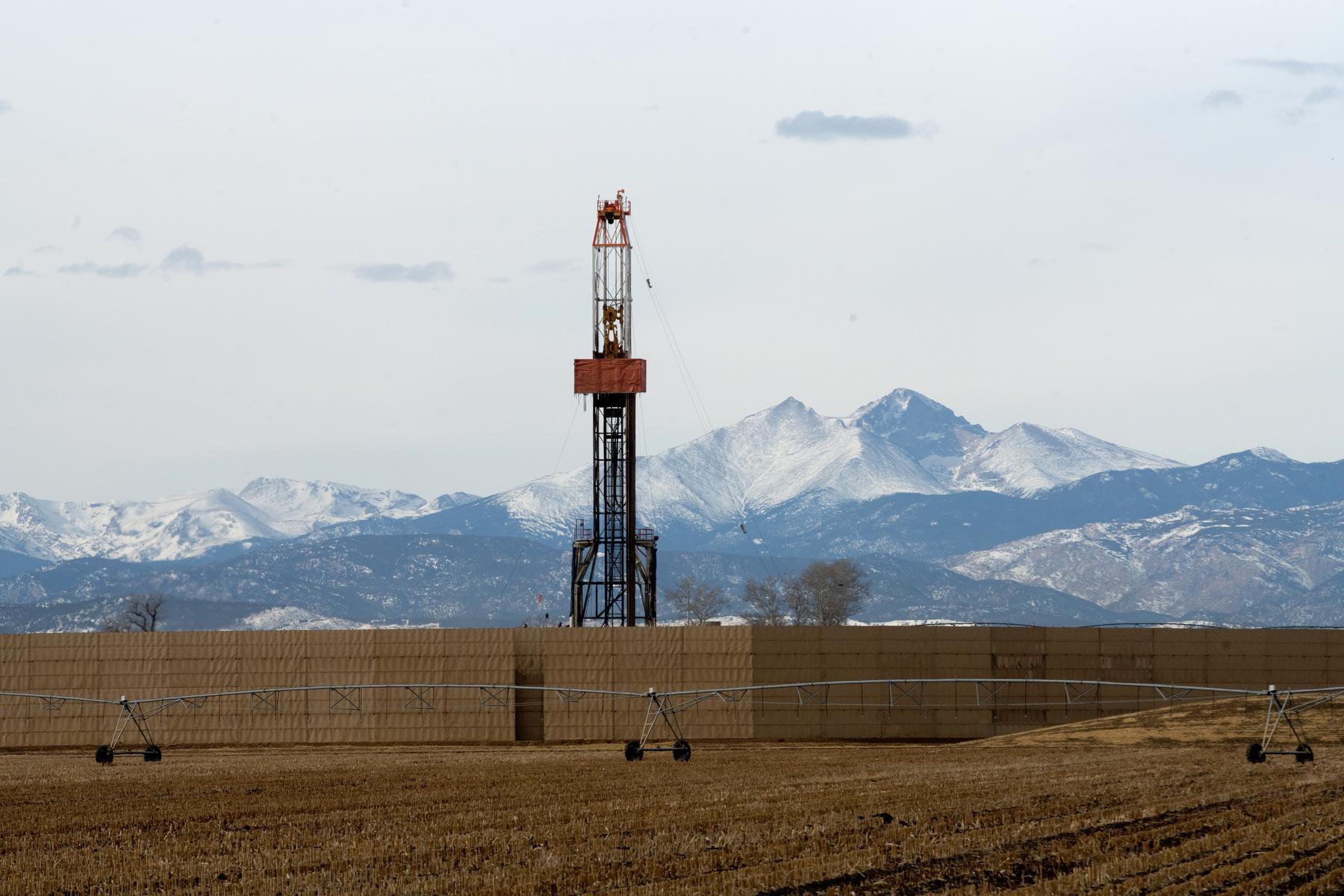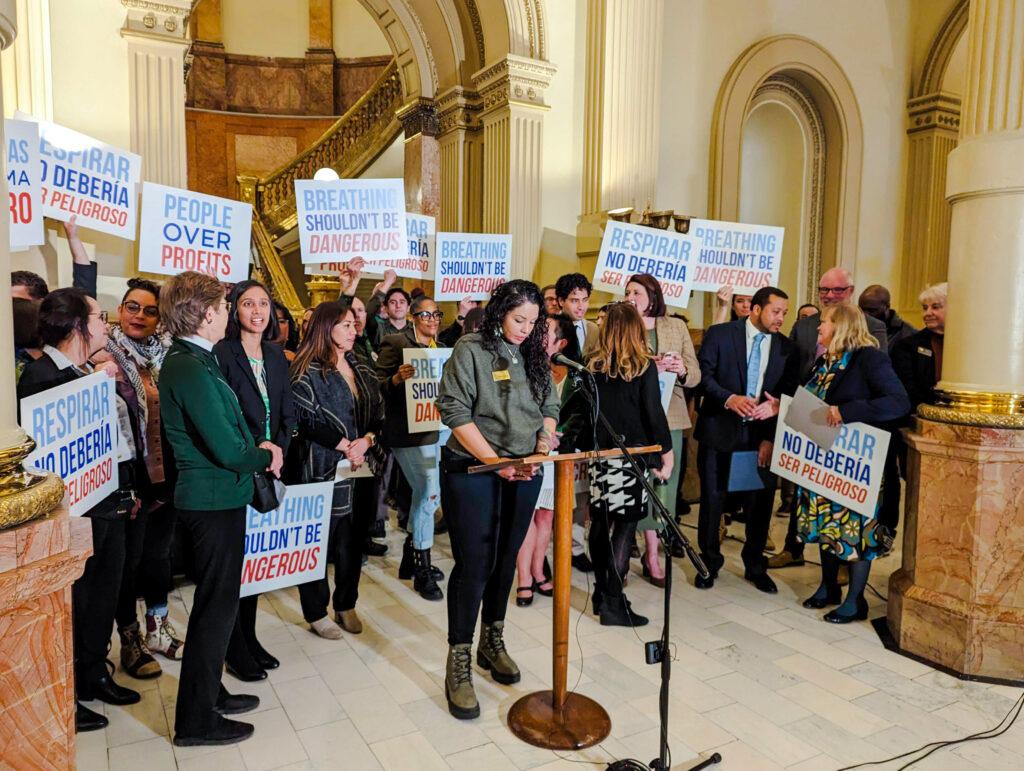
Colorado Democrats unveiled a major air quality package on Thursday, detailing a set of bills to help the state escape its chronic problem with summertime smog by clamping down on pollution from fossil fuel operations and industrial facilities.
After more than a decade of failing to meet federal air quality standards along the Front Range, supporters said the package is a long-overdue toolkit to control ground-level ozone — a dangerous lung irritant known to shorten human lives and worsen health problems.
The sprawling proposals would effectively overhaul three pieces of Colorado’s approach to regulating air pollution: permitting, enforcement and new industrial pollution rules.
One bill, for example, would give air quality regulators direct control over any permits for new pollution sources. If a company repeatedly violates emission limits in those permits, a second bill would require far more severe financial penalties. A third bill is a grab-bag of more direct policies, including a pause on oil and gas drilling during the summertime ozone season.
The package of proposed legislation could reignite tensions between environmental groups and Gov. Jared Polis, who was not consulted when the bills were being drafted and is currently reviewing the proposals, according to governor’s office spokesperson Shelly Wieman.
That fight has grown more acute since the U.S. Environmental Protection Agency declared a nine-county region along the Front Range as a “severe” ozone violator in 2022 due to its inability to reduce pollution levels. If the region fails to regain compliance by the summer of 2027, the federal government could supersede local authorities and step in with its own corrective plan.
While the governor’s administration has called for new regulations on lawn equipment and oil and gas drilling, many clean air advocates fear it’s not aggressive enough to meet the federal deadline.
That frustration broke into public view last year after progressive lawmakers proposed legislation with a wide-ranging set of new air permit requirements. Sponsors later dramatically pared back the legislation amid resistance from business groups and the governor’s office. In the end, the legislation shifted into a call for a committee to study the ozone issue instead. Each of the new bills announced Thursday is a product of the panel’s work during the legislative offseason.

It’s unclear if the air pollution overhaul has a path forward in the Democratic-controlled legislature. Wieman said Polis’ office was monitoring the legislation, but said the administration has already enacted new rules to reduce emissions and improve air quality.
The Colorado Oil and Gas Association and the American Petroleum Institute Colorado, the state’s top fossil fuel groups, have planned a press conference for Thursday afternoon to warn the package would “severely inhibit the ability for the oil and natural gas industry to continue to operate in Colorado and threaten the state’s economy.”
Each of the bills is set for official introduction this week. Since the debate over the package could last months, here’s a summary of the proposals.
Bill 1: Tougher air quality enforcement
The proposal aims at companies that repeatedly violate state air quality standards.
A top target is Suncor Energy, the Canadian oil and gas company operating the state’s only oil and gas refinery. The Commerce City facility reports dozens of instances yearly where it released more pollution than allowed under its state air quality permit. Despite the track record, it only tends to face penalties every few years through complex settlements with regulators.
In the latest settlement announced last month, Suncor Energy agreed to pay $2.5 million in direct penalties for two years of violations. Air quality advocates say the state could have demanded a $30 million fine from a company that reported $27 billion in profits in 2022.
The new proposal would give regulators and the public tools to pursue far more aggressive penalties. It would create a new “repeat violator” category, which would apply to any company that breaks state air quality laws more than five times in a three-year period. Further violations would then result in a mandate to cut emissions.
The bill would also allow state regulators to levy fines without filing an action in district court. It would also allow the public to sue to enforce air quality regulations if the state fails to take action on its own.
Bill 2: Tougher air quality permitting
The legislation would overhaul the state’s process for permitting new sources of air pollution, giving more authority to air regulators before the state can issue standard oil and gas permits. It focuses on oil and gas drilling, which accounts for the largest share of smog-forming pollution along the Front Range.
That pollution has made it difficult for the region to comply with federal ozone standards.
Under current state regulations, companies drill new wells after receiving permits from state oil and gas regulators. The new bill would require those companies to first obtain a permit from state air regulators before oil and gas regulators give the final approval for drilling along the Front Range.
The proposal would also overhaul the process regulators use to issue new pollution permits, effectively ending a practice in which the state issues “minor source” permits for smaller projects.
Air quality advocates claim the current permitting system allows the state to approve oil and gas wells on an individual basis without considering the cumulative impact to regional air quality. If approved, the new bill would require state regulators to treat a plan for multiple wells as a single emissions source, which supporters say would more accurately estimate the potential pollution impacts.
Bill 3: New air quality regulations
The third bill proposes specific rules to cut releases of ozone ingredients along the Front Range.
One provision covers the early oil and gas production process, including drilling and hydraulic fracturing. Those activities are typically powered by internal combustion engines, which pump out large amounts of smog-forming gases during operation.
Under the new bill, those activities would no longer be allowed along the Front Range during the summer ozone season unless they’re powered by all-electric equipment.
Polis has directed his administration to tackle the same problem. Last year, the governor ordered state regulators to develop rules to cut nitrogen oxide emissions from petroleum production by 50 percent by 2030. Those rules are set to be finalized by the end of the year.
The proposal would codify the directive into state law, which supporters say would allow regulators to enforce the targets. It would also require regulators to issue regular reports on progress toward meeting the emissions reduction goals.
The bill would also require the Colorado Department of Transportation to develop a program to cut the overall amount of driving across the Front Range region.
Editor's note: This story has been updated to include a new comment from the governor's office.








